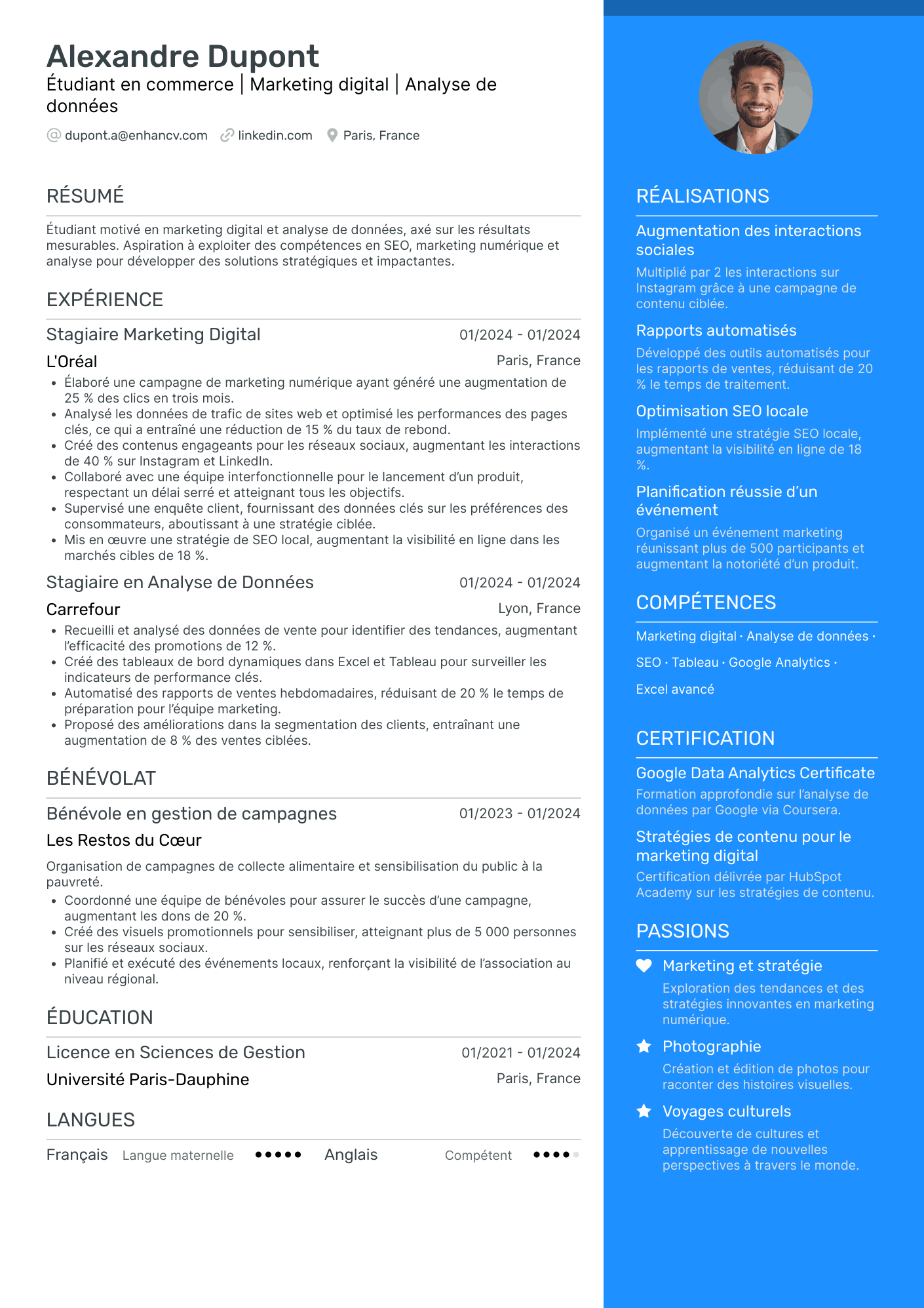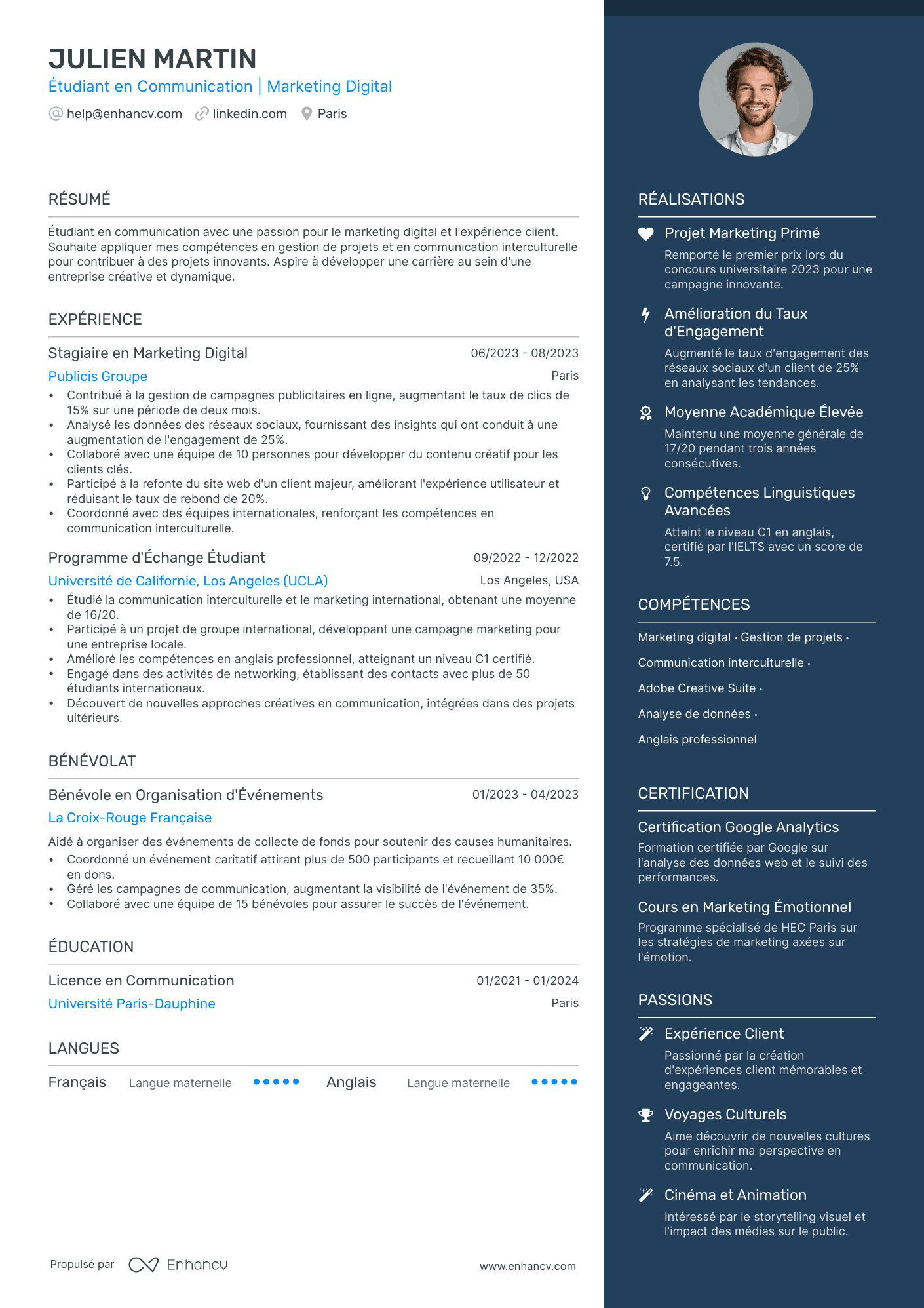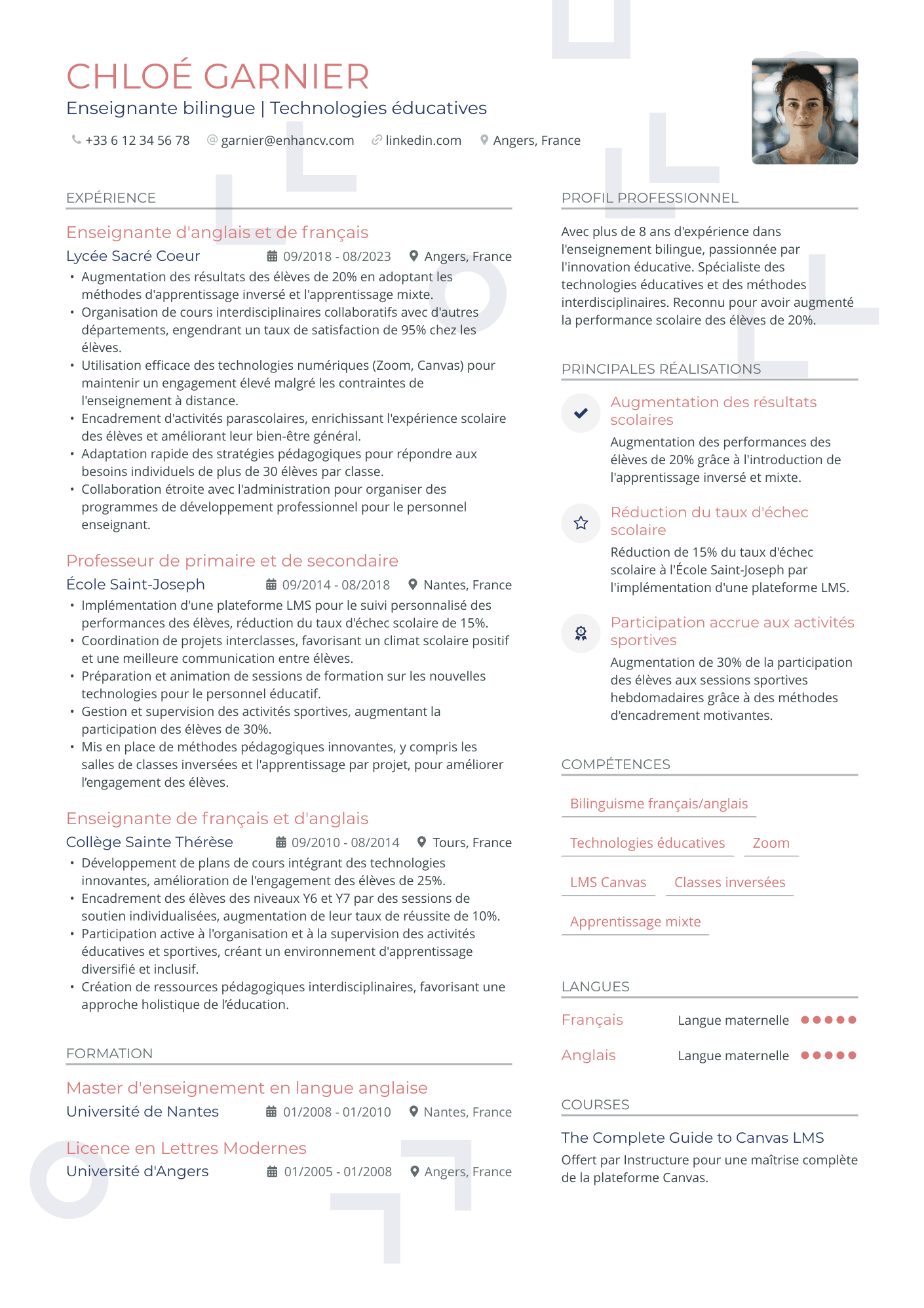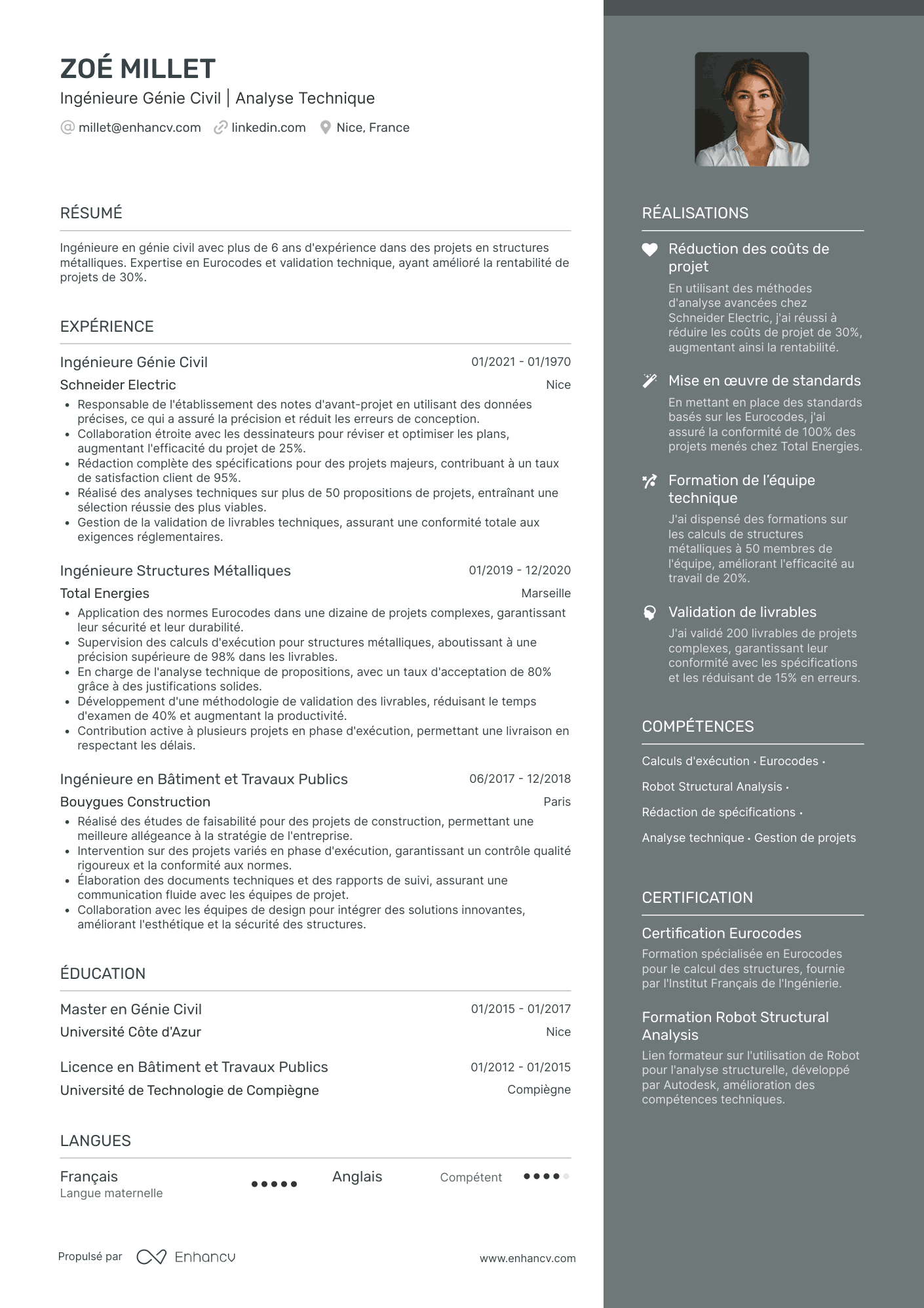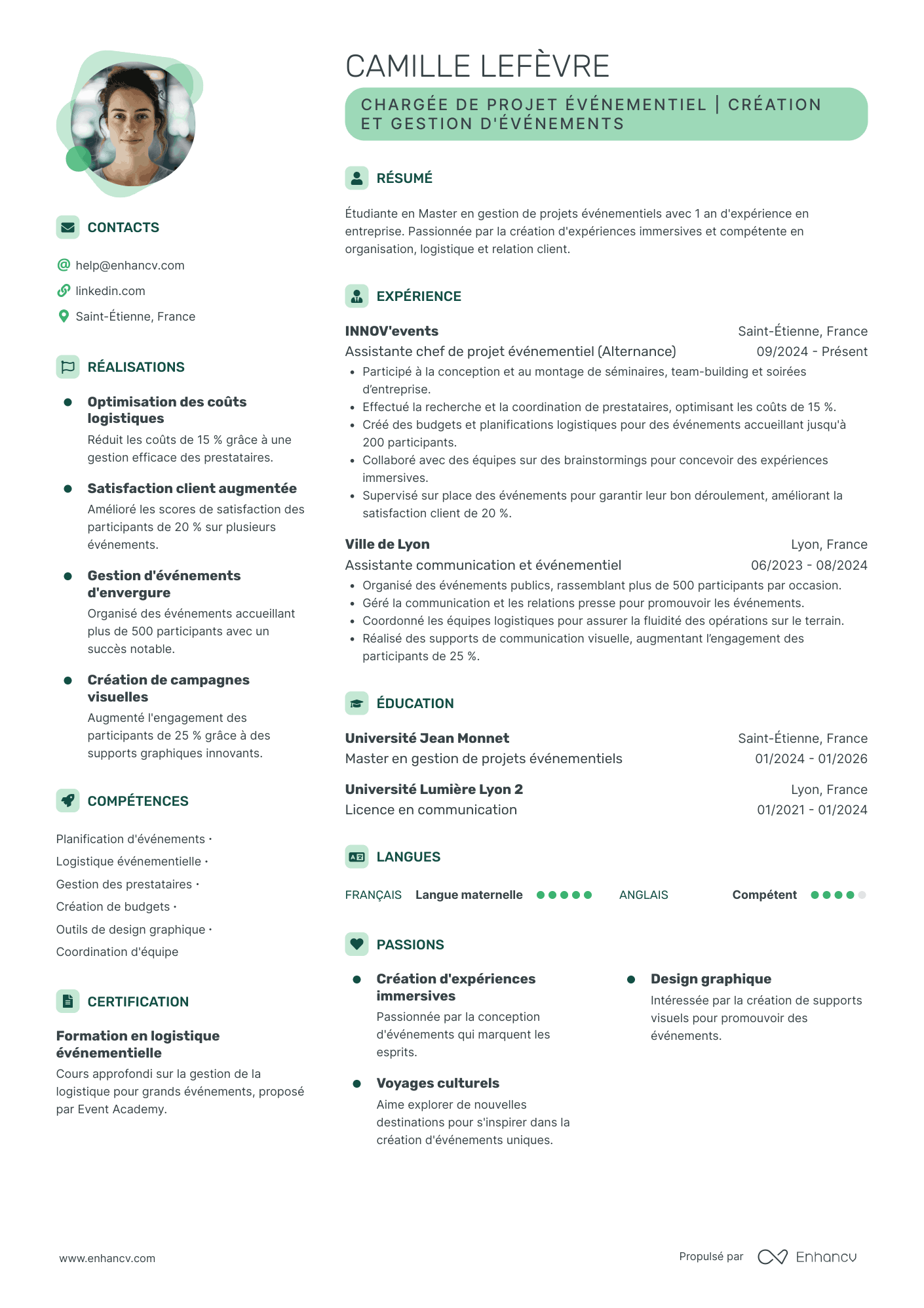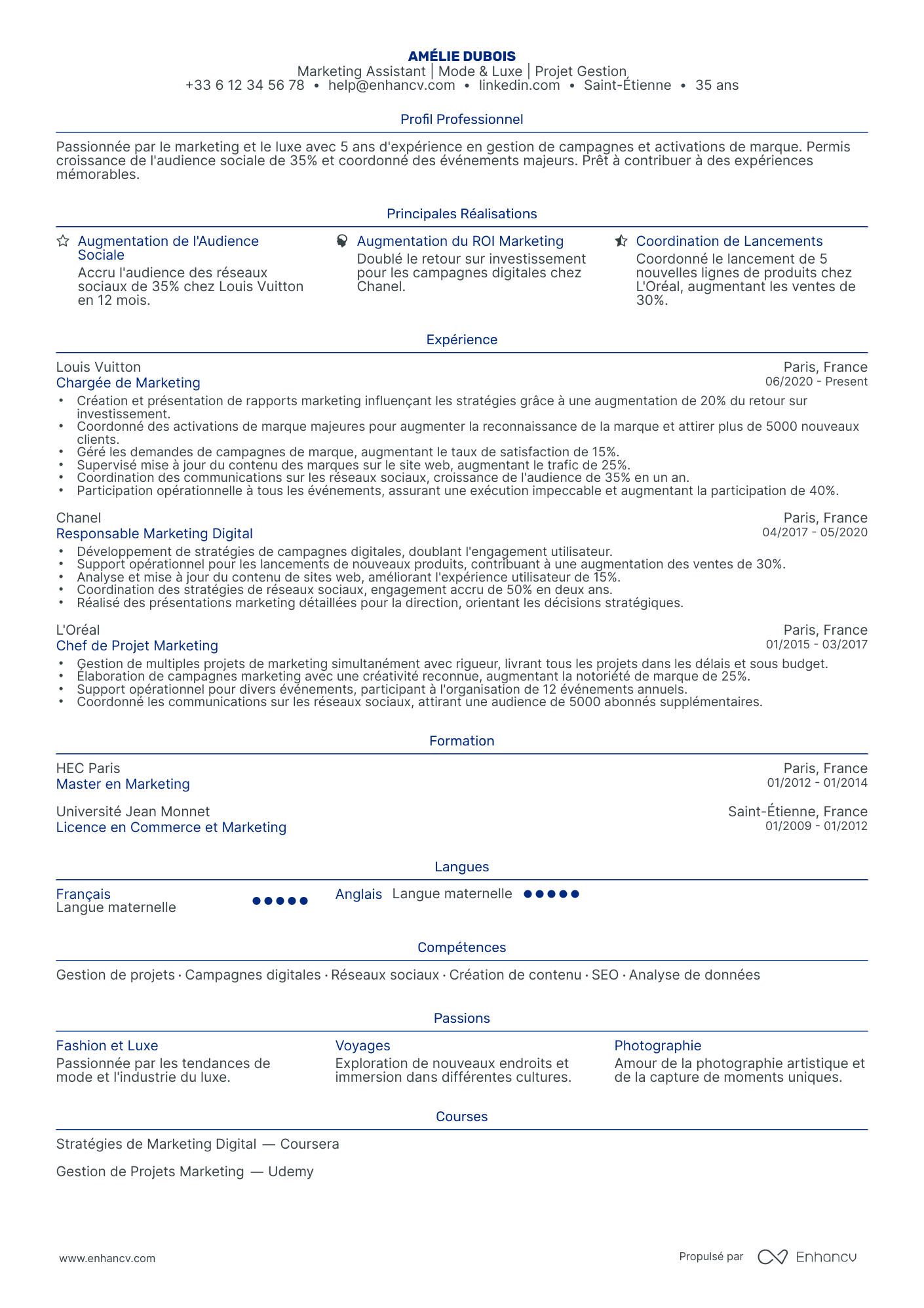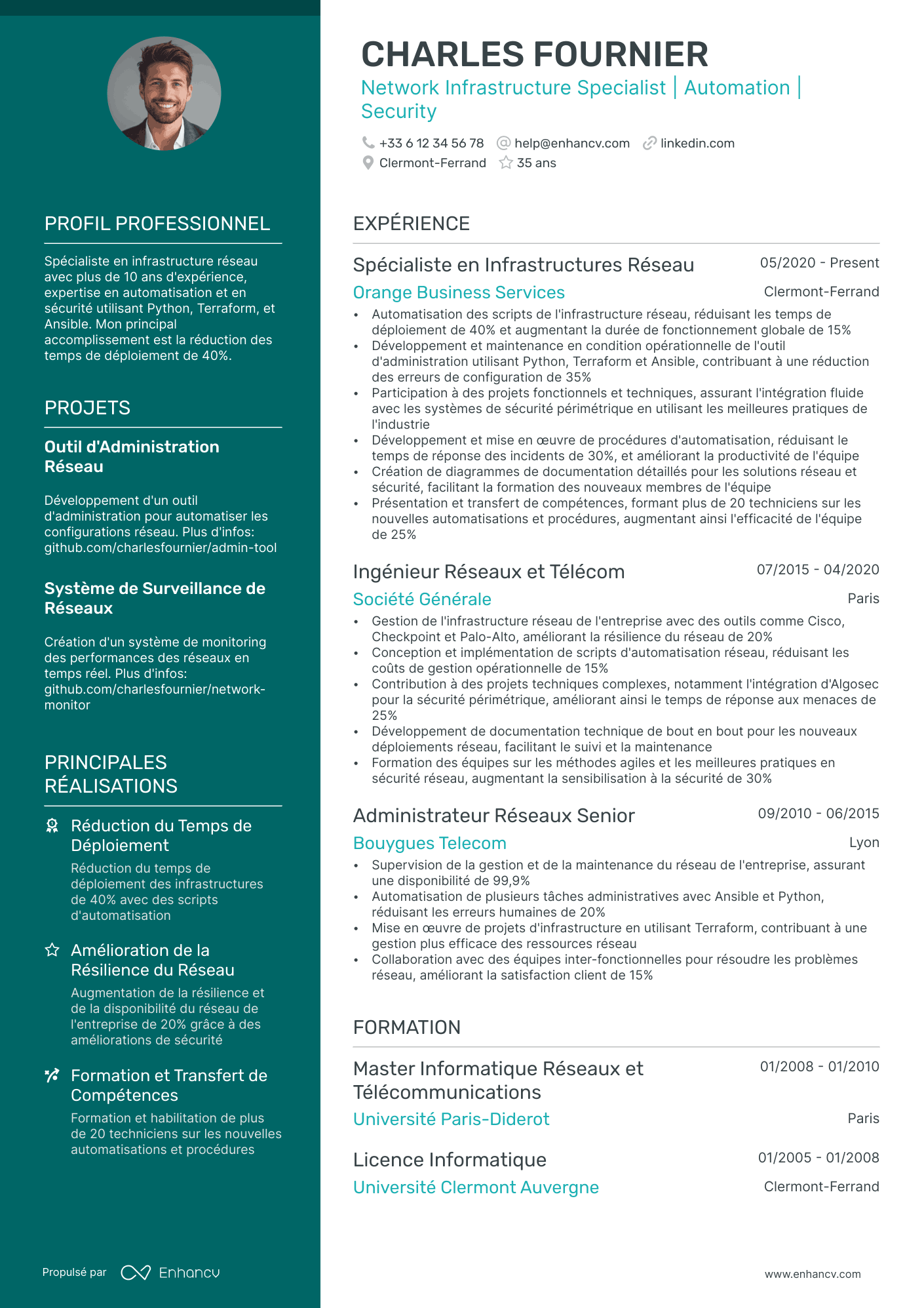Applying for jobs in France or at French companies means adjusting to a different resume format—the French resume, or CV, as they call it. While it includes the same key sections as a US resume, it also follows conventions that may feel unfamiliar. A professional photo, nationality, and other personal details are often expected, and the structure tends to be more standardized.
Some multinational companies accept English CVs, especially in tech and finance, but for most local roles, a French-language CV is preferred.
The transition may seem daunting, but with the right approach to formatting, translation, and recruiter expectations, it’s easier than it looks. This guide will walk you through everything you need to craft a strong, French-friendly resume.
Key takeaways
- French CVs require more personal details like nationality, date of birth, and a photo.
- French resumes prioritize structure over storytelling. While US resumes highlight achievements with creative formatting, French CVs follow a standardized, factual layout.
- The length expectation differs—a French CV is typically one to two pages, whereas American resumes are often just one page.
- Cover letters are usually mandatory. Unlike in the US, a tailored lettre de motivation is expected for most applications.
- Submitting a resume in English can limit your chances. Unless you’re applying to a multinational company, a French-language CV is preferred.
Let’s get into it.
US Resume vs. French CV vs. Europass CV. What’s the difference?
In Europe, job applications typically require a curriculum vitae (CV) rather than a resume. Unlike the US resume, which is concise and achievement-focused, European CVs tend to be more standardized and detailed.
The French CV follows this European convention but still allows for some flexibility, making it a middle ground between a structured Europass CV and a US-style resume.
Here are three key things to know about CVs in Europe and the UK:
- Standardization is key: While a US resume allows creative formatting, European job documents typically follow a reverse-chronological format with clearly defined sections.
- Personal details matter: Unlike US resumes, many European CVs (including French ones) may require a photo, nationality, or date of birth.
- Clarity over creativity: A French CV should be tailored to the role, but it still prioritizes clear structure and factual information over storytelling or design-heavy layouts.
Now, let’s look at how the French CV compares to a US resume and a Europass CV:
Differences between American and European resumes
| Format name | Length and detail | Sections included | Layout and formatting | Hiring preferences |
|---|---|---|---|---|
| US resume | 1-2 pages, concise | Summary, Experience, Skills, Education | Flexible layout, no photo, focused on achievements. | Preferred in the US and international roles—emphasizes accomplishments. |
| French resume | 1-2 pages | Personal details, Experience, Education, Skills, Languages | Standardized format, reverse chronological order, often includes a photo. | Expected for jobs in France—must follow local formatting and may require personal details. |
| Europass CV | 2 pages but can extend to 4 | Essential sections, plus personal info, language proficiency, and soft skills | Fixed structure, downloadable template. | Used for EU institutions, government jobs, academic roles, and mobility programs. |
For the purposes of this guide, we’ll use “French CV” and “French resume” interchangeably to keep things familiar while ensuring clarity.
No matter which term is used, the format and expectations remain the same.
How to write a resume for France (without speaking French)
One of the biggest questions when applying for jobs in France or French organizations is whether to write a resume in French or English. The short answer? It depends on the job.
- If the job posting is in English and the company operates internationally, a resume in English is acceptable—especially in industries like tech, finance, or multinational corporations.
- If the job posting is in French or the company is primarily French-speaking, a French CV is expected.
PRO TIP
The golden rule of resume writing applies here—customization is key. The information you put on your resume should be aligned with the job and industry requirements. Always follow the language of the job description as a guide.
Even if you're not fluent in French, you still have solid options for crafting a strong application:
- Leverage AI: Many job seekers use AI tools like ChatGPT to generate a resume or translate their existing one. While not perfect, AI can be a great starting point for adapting your content.
- Use proven examples: Enhancv’s French resume guides and examples provide job-specific insights that meet industry expectations.
However, AI and templates alone won’t guarantee an interview call. To leave a lasting impression on hiring managers, formatting and structure matter.
Below, we’ll guide you through those fine little details that make your resume fit French standards regardless of whether it’s in French or English.
What sections to include in a French resume
Even when writing in English, formatting your resume to match French CV conventions helps ensure that recruiters recognize the structure they expect.
Here’s a breakdown of the essential sections and how they compare to US resumes.
Contact information or Informations personnelles
Just like in the States, the contact information section sits at the top of a French CV. It provides employers with ways to reach you—here’s what they seek in the header:
- Name, phone number, and email: Standard across both US and French resumes.
- LinkedIn profile: A hyperlink to your LinkedIn account is highly recommended in modern applications.
- Full address? Not necessary. Listing your city and country (especially if applying from the US or targeting a remote role) is often enough.
- Personal website or portfolio: If relevant to your industry (e.g., tech, design, writing), including a link can add value.
Resume profile or Profil
The Profil section in a resume for France serves a similar purpose to a resume summary in the US. It’s a short personal statement that introduces key skills, experience, and career goals. Placed at the top third of your resume, this segment sets the right tone for your application.
Here’s how to craft yours:
- Keep it concise and to the point: Write two to four sentences capturing your background, expertise, and strengths.
- Focus on relevance: Highlight your core competencies, tailoring them to the job.
- "I" statements: Unlike US resumes, where personal pronouns are usually omitted, French CVs may naturally include je (I) when written in the first person. This is completely acceptable—just maintain consistency and don’t switch between first and third person.
- Avoid clichés: Keep your wording clear and specific, avoiding vague phrases like professionnel dynamique (dynamic professional) or travailleur motivé (motivated worker). Instead, focus on concrete abilities and achievements that demonstrate your value.
Here’s an example:
Work experience or Expérience professionnelle
The French resume experience section follows a structured, factual format, listing roles in reverse chronological order (starting with the most recent position). Make sure you underline key contributions and measurable achievements, rather than just listing responsibilities.
Each entry should include:
- Job title
- Company name
- Location
- Start and end dates
- Concise bullet points: Keep descriptions short and action-oriented.
- Achievements over tasks: Instead of listing duties, emphasize results using measurable impact where possible.
Below is an example fit for a lawyer’s resume. You can browse through our 1800+ examples and customize your resume of choice using Enhancv’s resume builder.
- •Rédigé et revu plus de 200 contrats commerciaux pour des clients de secteurs variés.
- •Participé à la structuration juridique de 10+ fusions-acquisitions d'entreprises cotées.
- •Intervenu dans des litiges commerciaux ayant conduit à une réduction des pertes financières de 20 % pour les clients.
Education or Formation
The education section in a resume in French needs to be adapted to French terminology to ensure clarity for recruiters.
Here’s how to tackle this:
- Translate degree titles correctly: Bachelor’s Degree is Licence; Master’s Degree is Master; and PhD is Doctorat.
- List institution names and graduation years: Place the degree and specialization first, followed by the university name and the year of graduation.
- Mention distinctions: French employers may not be familiar with the GPA scale used in the US. Instead, you can highlight academic honors in a recognizable way, such as mention bien (with honors) or mention très bien (with high honors).
- Skip high school details: These are generally unnecessary unless you recently graduated and they’re highly relevant.
Skills or Compétences
Your French resume needs to spotlight technical skills, tools, and industry-specific expertise. Soft skills are not listed separately—instead, they should be demonstrated through experience and achievements in other sections.
With the rise of skill-based hiring and the widespread use of applicant tracking systems (ATS), listing relevant hard skills and technologies is more important than ever. Many companies filter resumes based on specific keywords, so integrating the right abilities boosts your chances of being noticed.
So, when crafting your skills sections, or Compétences, consider the following:
- Keep the section clear and easy to scan—avoid wordy descriptions that could confuse an ATS.
- Recruiters look for concrete skills relevant to the role. Tailor your list to the job description.
- Further categorize your skills, especially if you have expertise in multiple areas within your field.
Here’s a good example of relevant skills on a front-end developer resume, made in our app:
Additional sections to enrich your French resume
Some sections, while not mandatory, can add credibility and relevance to your French CV. Among them, certifications and language skills are almost always included, as they provide concrete proof of qualifications and international adaptability.
- Certifications: If you hold industry-recognized certifications, listing them can strengthen your application. They should be placed in a dedicated certifications section or integrated into the education or skills section if space is limited.
- Languages: Since language proficiency is highly valued in international and French-speaking environments, it’s common to include a Langues section. Be sure to use recognized terms (e.g., Anglais courant, Espagnol intermédiaire) and indicate certification levels (TOEFL, DELF, etc.) if relevant.
More optional sections
| Section heading | Best placement |
|---|---|
| Publications or Travaux publiés | Best for academic, scientific, or research-heavy roles, including university positions and R&D careers. |
| Professional memberships or Affiliations professionnelles | Useful for lawyers, medical professionals, engineers, and other regulated professions where industry affiliations add credibility. |
| Volunteering or Bénévolat | Strong addition for nonprofit, social impact, or public sector roles, as well as for recent graduates looking to demonstrate transferable skills. |
| Awards or Prix et distinctions | Best for highly competitive industries like finance or creative fields where recognition sets candidates apart. |
| Personal projects or Projets | Ideal for tech professionals, designers, writers, and freelancers looking to showcase independent work, innovation, or portfolio pieces. |
Finally, remember that not all additional sections will be relevant to every job. Align your French resume with the job description, emphasizing only the sections that reinforce your candidacy for a specific role.
French-language resume template
To make things easier, we've created a copiable template to help you overcome language barriers. either by using our resume builder or leveraging ChatGPT prompts to kickstart the creative process.
Paul Anderson
Représentant du service client
+33 6 12 34 56 78 | paul.anderson@enhancv.com | @LinkedIn | Lyon, France
Profil
Professionnel du service client avec 3+ ans d’expérience dans la gestion des relations clients et l’optimisation des processus de support. Expérience réussie dans des environnements internationaux, avec une capacité démontrée à gérer jusqu’à 50+ demandes par jour et à augmenter la satisfaction client de 25 % grâce à des solutions personnalisées. Recherchant un poste au sein d’une entreprise dynamique à Lyon pour offrir un service exceptionnel et contribuer à la fidélisation des clients.
Expérience professionnelle
Représentant du service client
Decathlon France | Lyon, France
Juin 2023 – Présent
- Assuré le support client en magasin et en ligne, traitant +1000 demandes mensuelles avec un taux de résolution en premier contact de 85 %.
- Mis en place un processus d’escalade simplifié, réduisant le temps de traitement des réclamations de 30 %.
- Formé une équipe de 5 nouveaux collaborateurs, améliorant la rapidité et la qualité des réponses clients.
Spécialiste du support client
Airbnb | Dublin, Irlande
Septembre 2022 – Mai 2023
- Géré un portefeuille de +200 hôtes et voyageurs en fournissant une assistance proactive et réactive.
- Maintenu un taux de satisfaction de 96 %, surpassant l’objectif interne de 90 %.
- Collaboré avec les équipes de modération et de résolution de litiges pour accélérer le traitement des différends, réduisant les délais de résolution de 40 %.
Formation
Licence en Commerce International
Université de Floride, États-Unis
Diplômé : 2018
Certification
- Certification en Relation Client Omnicanale, 2022
- Certificat Voltaire (orthographe et grammaire française avancées), 2021
Compétences
- Gestion des réclamations et support multicanal (chat, email, téléphone)
- Outils CRM : Salesforce, Zendesk, HubSpot
- Analyse et amélioration de l’expérience client
- Résolution de conflits et gestion des retours
Langues
- Anglais (natif)
- Français (courant – B2/C1)
Here’s what an American shared about getting a job in France:
The French job market is primarily reserved for the French, and if you’re shooting for a position like one of those I mentioned, you’ll have to stand out in greater, arguably unreachable, ways. [...] Ask yourself, what can you bring to the table that a qualified French person can’t? Maybe it’s your command of the English language (though many Parisians speak English well). One step further, maybe it’s your understanding of American culture which sets you apart.
Guest writer at The American in Paris
Now that you know the basics and can confidently craft a resume for French employers, let’s dive deeper into key formatting tips to set you up for success.
Formatting your French resume—best practices
A well-structured French CV is not just about listing experiences—it’s about aligning with French hiring expectations, ATS compatibility, and industry norms.
Optimize your resume formatting for maximum impact with the guidelines below.
Tailoring to job descriptions
Customizing your resume for each job application is a must, as recruiters in France value relevance over quantity.
Here’s how to do it:
Step 1. Research the company
- Check company culture and industry expectations—a corporate job (e.g., finance) will have stricter formatting rules than a creative role (e.g., design, marketing).
- Read French job listings carefully, noting keywords they use for skills, qualifications, and responsibilities.
- Identify soft skills that French employers value.
Step 2. Align language and terminology
- Translate key sections into French to increase ATS compatibility.
- Adapt job titles:
- Software Engineer → Ingénieur Logiciel
- Marketing Manager → Responsable Marketing
- Adjust education equivalents:
- Bachelor's Degree → Licence
- Master’s Degree → Master
- Associate Degree → DUT (Diplôme Universitaire de Technologie)
The French language and its love for homegrown words
Did you know that France has an official body dedicated to preserving the purity of the French language? 🇫🇷 The Académie Française, founded in 1635, ensures that French remains distinct from English and other languages by promoting uniquely French alternatives for commonly used foreign words.
For example, while much of the world has adopted "email", the French officially use courriel (a blend of courrier (mail) and électronique (electronic). Similarly:
- Hashtag → mot-dièse
- Smartphone → téléphone intelligent
- Startup → jeune pousse (literally "young shoot")
So when adapting your resume for France, remember—localizing not just your job titles, but also industry terms can make a strong impression on recruiters.
Step 3. Use an ATS-friendly format
- Stick to reverse chronological order—it's both recruiters' favorite and the easiest format for ATS to parse.
- Avoid tables, images, and fancy charts—these can confuse older ATS software.
- Stick to a classic format with clear section headings.
- Stick to traditional fonts like Arial, Rubik, or Calibri, size 10-12 pt.
Visual appeal and structure
A clean, professional layout increases readability and improves first impressions. Prioritize readability and consider European CV standards.
- Don’t take risks—choose a fail-proof, еlegant template that aligns with French CV standards.
- Unlike the US letter format (8.5 × 11 inches), French CVs follow the standard European A4 size. Set it before you start crafting your resume to avoid the hassle of adjusting it afterward.
- Maintain consistent margins and adequate spacing between sections.
- Apply bullet points for clarity and avoid long paragraphs.
- Use subtle colors and a palette that fits your industry. Stick to black, navy, or dark gray for finance, law, and healthcare, or blue and teal for tech and marketing.
- Be mindful of date formatting. France follows the DD/MM/YYYY format, not MM/DD/YYYY. For example, 12/05/2023 (12 May 2023).
- Photos are common in French CVs, but they must be professional. Avoid selfies or casual photos—stick to passport-style or LinkedIn-quality images.
- Unless requested otherwise, always save and send your resume as a PDF (not a Word document) to maintain formatting.
French resume glossary–key terms you need to know
To ensure accuracy and clarity, use industry-standard French terms. Below is a handy glossary for essential resume terms.
Action verbs
- Achieved → Atteint
- Managed → Géré
- Developed → Développé
- Led → Dirigé
- Implemented → Mis en œuvre
- Optimized → Optimisé
- Spearheaded → Piloté
- Designed → Conçu
- Executed → Exécuté
- Streamlined → Rationalisé
- Improved → Amélioré
- Negotiated → Négocié
- Coordinated → Coordonné
- Analyzed → Analysé
- Innovated → Initié
Next, look at the most common job titles Americans hold in France.
Professions
- Software engineer → ingénieur logiciel
- Marketing manager → responsable marketing
- Sales representative → représentant commercial
- Project manager → chef de projet
- Business analyst → analyste d’affaires
- Financial analyst → analyste financier
- Graphic designer → graphiste
- Customer service representative → chargé de clientèle
- HR manager → responsable des ressources humaines (RH)
- English teacher → professeur d’anglais
- Copywriter → rédacteur/rédactrice
- Consultant → consultant(e)
- Data scientist → scientifique des données
- UX/UI designer → designer UX/UI
- Restaurant manager → gérant de restaurant
- Tour guide → guide touristique
- Translator → traducteur/traductrice
Linguistic quirks often catch English speakers off guard, especially when writing professional documents like resumes.
PRO TIP
Unlike English, French does not capitalize job titles, nationalities, or languages unless they begin a sentence. For example, "Je suis ingénieur logiciel" (I am a software engineer) or "Elle parle anglais" (She speaks English).
However, nationalities do get capitalized when referring to people—for instance, "un Américain" (an American) vs. "il est américain" (he is American).
Finally, let’s explore some French resume examples, tailored to five common roles.
Seven real-life examples of French resumes
If you’re looking for a work-study (“alternance”) contract to combine education and professional experience, a well-structured resume is essential to impress recruiters.
CV alternance
A well-structured internship CV allows a university student to highlight their academic background, skills, and motivation, securing valuable professional experience.
CV pour étudiants universitaires
English teachers need to showcase their teaching experience, language proficiency, and pedagogical skills to make a strong impression on schools and language institutions.
CV enseignant
Here’s an example of an engineer resume that highlights technical skills, problem-solving abilities, and hands-on experience—everything you need for your next opportunity.
CV ingénieur civil
Project management is a transferable career path for people working abroad, as strong leadership, organization, and problem-solving skills are valued across industries.
Marketing is one of the most accessible fields for Americans looking to work abroad, thanks to the universal demand for creativity, strategy, and digital expertise.
CV marketing
With tech skills in high demand worldwide, many US citizens break into international job markets as web developers. A well-structured web developer resume should showcase your coding expertise, problem-solving abilities, and experience with front-end or back-end technologies.
CV web développeur
Frequently asked questions about resumes for France
The French job market comes with its own set of rules, mais pas de panique—we’ve got you covered! Below, we’ve answered some of the most common questions to help you confidently apply for jobs in France.
What are the must-haves to work in France?
To work in France, you typically need a valid work visa (unless you're an EU citizen), a French-style CV, and sometimes a translated diploma. Proficiency in French is often required, depending on the industry, and a cover letter is usually expected when applying for jobs.
How long should my French resume be?
A French CV should be one page for entry-level roles and up to two pages for experienced professionals. Unlike US resumes, which focus on achievements, French CVs tend to be more structured and detailed, including education, work experience, and skills in a clear chronological format.
Do I need a cover letter in France?
Yes, a “lettre de motivation” (cover letter) is typically expected for job applications in France. It should be concise (up to 300 words) and explain why you're a good fit for the role, showing how your skills and experience align with the company’s needs.
What should I expect from a job interview in France?
French job interviews tend to be structured and formal, often with multiple rounds. You should be prepared to:
- Discuss your technical skills and experience in detail.
- Answer questions about your long-term career goals.
- Sometimes take tests or case studies for certain roles.
- Expect conversations about your motivation for working in France, especially if you're an international candidate.
Should I translate my CV into French or submit it in English?
If you're applying to a French company, you should always submit your CV in French unless the job posting explicitly states otherwise. Multinational companies or startups may accept English resumes, but local businesses and government jobs will expect a French CV.
Conclusion
Adapting your resume to the French job market may seem challenging at first, but with the right structure, formatting, and localization, it’s entirely manageable. Ready to craft yours? Download your free French CV template and start applying today.
Make one that's truly you.





